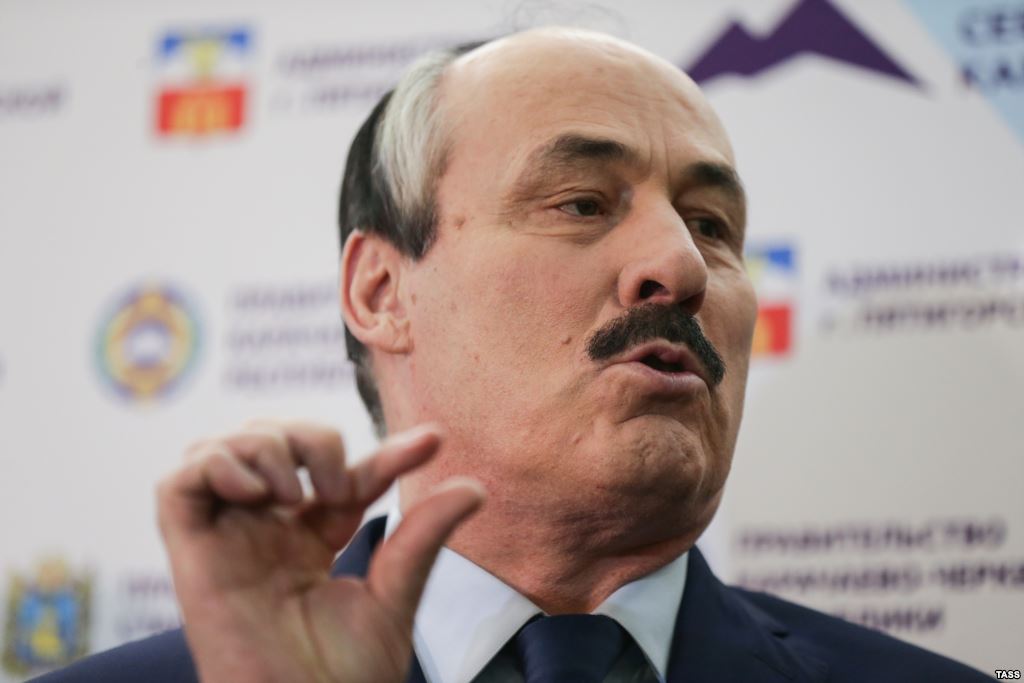
Is Ramazan Abdulatipov Under Attack?
Publication: Eurasia Daily Monitor Volume: 12 Issue: 133
By:

Hardly any other political figure in the contemporary history of the North Caucasus can rival Ramazan Abdulatipov when it comes to the number of rumors about his resignation since the start of his career as the republic’s governor. Rumors about his resignation started when he was still the interim head of Dagestan (Mk.ru, August 5, 2013).
During the initial few months of his governance, Abdulatipov’s presence in Dagestan was welcomed, as many people believed that Moscow appointed him to break the clan system in the republic. However, those hopes were dashed with his first moves, which showed that a new clan had come to power in the republic rather than a reformer. A questionable fight against corruption has targeted only figures not under Abdulatipov’s control (Moscow-post.com, October 20, 2014). More recently, at the start of July 2015, the head of Dagestan proposed introducing the institution of anticorruption commissars, who would work in the republic’s municipalities, ministries and other government agencies (Vestnik Kavkaza, July 2). Abdulatipov is also known for controversial statements—declaring, for example, at the international economic forum in St. Petersburg in June 2014: “If you do not want to be blown up in Moscow, support our republic financially” (Kavpolit.com, June 21).
For the two years of his rule in Dagestan, Abdulatipov’s only achievement has been the removal of the republic’s main mafia figure—Makhachkala Mayor Said Amirov, who had governed virtually the entire republic behind the scenes (RIA Novosti, June 1, 2013). Abdulatipov’s participation in this was minimal, however, because Russian forces dispatched from Moscow carried out the operation against Amriov with the personal permission of President Vladimir Putin, which was confirmed by the president’s spokesman (RIA Novosti, June 7, 2013).
Previously, it was the competing clans and supporters of the sacked mayor Amirov who opposed Abdulatipov and spread rumors about his dismissal. But it now appears that many others are opposed to the Dagestani governor, including forces close to Moscow. For example, a website affiliated with the Dagestani Ministry of Interior, Kavkazpress.ru, openly attacked Abdulatipov, accusing him of corruption and nepotism. Kavkazpress.ru is the only website that provides live broadcasts from the scenes of special counter-insurgency operations and is the first to publish photographs and video recordings of special operations conducted by the Dagestani police (Kavkazpress.ru, July 10). The website published compromising information not only about Ramazan Abdulatipov himself, but also about members of his family, including his son. Information about double dealing by Abdulatipov’s entourage is also regularly made public (Sovsekretno.ru, September 16, 2014).
This time, the attack against the head of the republic came after the republican TV channel featured a program criticizing the Dagestani interior ministry. The TV program accused the republican police of beatings, kidnappings and extorting money from the victims. In response, Dagestan’s Interior Minister Abdurashid Magomedov ordered the “inspection, examination and seizure of documents” and other items, including electronic media, from the republican TV channel dating back to January 1, 2013”—that is, Abdulatipov’s entire tenure as governor thus far (Kavpolit.com, July 11).
Moscow’s current envoy to the North Caucasian Federal District, Sergei Melikov, is considered to be Abdulatipov’s main rival. Melikov is a member of one of Dagestan’s largest ethnic groups, the Lezgins, who are concentrated in southern Dagestan and northern Azerbaijan. Melikov, however, converted to Christianity, and in an Islamized society like Dagestan’s, this is unacceptable to a majority of the population (Kavpolit.com, January 19). Dagestanis are also not completely happy with Abdulatipov, because he is not a particularly devout Muslim.
Abdulatipov also has trouble controlling the situation in Dagestan’s regions. For example, the mayor of Khasavyurt, Saigidpasha Umakhanov, an ethnic Avar, is quite independent from Makhachkala. Umakhanov is in conflict with Chechnya’s Ramzan Kadyrov and is spoiling the fraternal relations between Abdulatipov and Kadyrov. Abdulatipov essentially does not control Khasavyurt. Nor has the Dagestani governor been able to cope with the mayor of Derbent, Imam Yaraliev, who, like Melikov, is an ethnic Lezgin (Onkavkaz.com, June 22). Derbent is considered to be the oldest city in the North Caucasus and Russia, dating back two thousand years. Moscow has allotted substantial funds to celebrate Derbent’s second millennium, which has caused frictions between Makhachkala and Derbent. Moreover, the southern Dagestani city boasts a large alcohol-production business. Whoever controls Derbent controls practically all of southern Dagestan.
Abdulatipov has received relatively little support from Vladimir Putin: had he received greater Kremlin support he would have been better able to fight off his adversaries in the republic. In addition, Abdulatipov does not have his own militarized units, as does his neighbor, Ramzan Kadyrov. The Dagestani governor also has no support among the republic’s population, as people were quickly disappointed by his performance in office.
Thus, the situation around Ramazan Abdulatipov’s activities in Dagestan has clearly grown more tense. If Moscow does not intervene and settle the conflict soon, Abdulatipov will eventually be fired and replaced by a new republican leader who will be handpicked by someone in Moscow.




